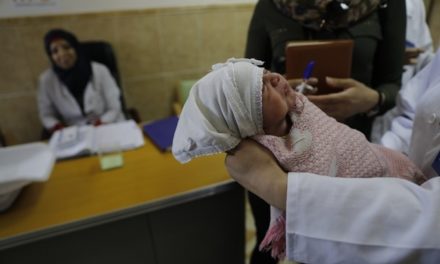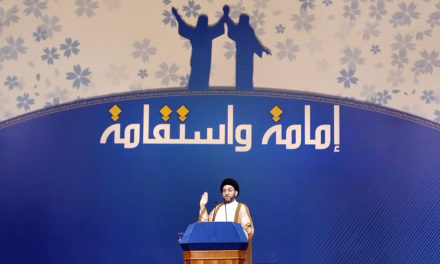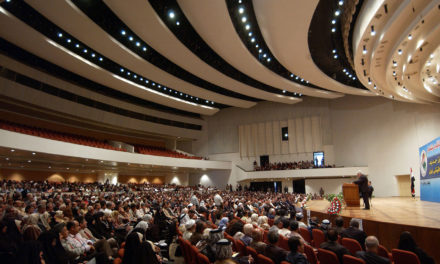Major operations in populated areas of Iraq may have ended in a decisive win for Iraq’s armed forces but the decimation of Da’ish in the land of two rivers is not over yet. What was left of Da’ish’s military contingents fled to Iraq’s western desert looking for reprieve but did not find any there. Riding the wave of victory, Iraqi forces are now initiating a new phase in their war on terrorism as they look to root out the Da’ish elements aiming to revive an insurgency. With elections looming on the horizon, the security situation is steadily but cautiously improving.
Not so quiet on the Western front
Over the last fortnight, Iraqi forces have conducted one of the biggest clearing operations in western Iraq to date, with the aim of dislodging Da’ish remnants from the Jazirah desert region that connects the restive provinces of Ninawa, Salahuddin and Anbar. Within the first five days of this operation, Iraq’s Prime Minister Haider Al-Abadi announced that 14,000km2 had been recaptured and secured as Da’ish elements in the desert melted away. This operation marks a historic achievement for the government as it is reasserting control over land that has been out of Baghdad’s reach since the collapse of the former regime in 2003.
Upwards of eighty villages have so far been retaken as operations continue in the area that spans around 30,000km2, reaching out from north of the Euphrates River in Anbar and extending into the desert region in western Salahuddin province and all the way up to southern Ninawa. This vast and lawless expanse of desert has been home to training bases, weapons depots and staging areas for launching terror attacks for over a decade, utilized by both Da’ish and its predecessors during their previous terror campaigns in Iraq. Recapturing and securing this area will deal a major blow to Da’ish aspirations of regrouping and rebuilding their organization into a competent fighting force once more.
The most lucrative target in this desert is Wadi Horan, the longest valley in Iraq, which stretches for 350km from the border region with Saudi Arabia all the way to the Euphrates River. The valley, with its famous 200-metre- deep gorges, has been under Da’ish control since the Iraqi military collapse in 2014 and has been converted into a Da’ish stronghold deep into the desert. Da’ish commanders have used this area as a safe haven to shield themselves from Iraqi and US-led coalition aircraft for years, as well as a critical logistics hub. The campaign to secure this terrain will also serve to bolster security along Iraq’s borders with Saudi, Jordan and most importantly Syria. In cooperation with hundreds of local Sunni tribesmen, Iraqi forces have launched several operations in the peripheries of Rawah and Rutba to tackle Da’ish terror cells camping in the area, and who have carried out dozens of deadly attacks on isolated army outposts in western Anbar over the past year.
The city of peace tastes some serenity
Meanwhile, last month saw Baghdad experiencing its most peaceful month in five years. The city escaped any car bomb or major IED attacks, marking the city’s least deadly month since November 2012. This milestone underscores how far the Iraqi people have come since the disastrous summer of 2014 and this success bears testament to the hard work of the security and intelligence apparatus which has fought and continues to fight a covert battle with Da’ish terror cells in Baghdad and the rest of the country.
However, the Iraqi government and military leadership must not fall into the trap of complacency. Da’ish terror cells are still active in the capital and provinces across the country and can strike at any moment. More resources and manpower must now be diverted away from the battlefield and into a functioning security structure that can ensure this peace continues in Baghdad and the rest of the country. Low-level terror attacks, which are a hallmark of a fledgling insurgency, are on the rise across Iraq in the wake of Da’ish’s military defeat. The terror cells behind these attacks must be terminated in order to build and maintain a new standard of security for the Iraqi people.
Sunni-on-Sunni violence is coming
The wounds of the Da’ish era will soon begin to heal but the scars might never fade away. One way in which these scars will remain is the fractured Sunni communities across Iraq, divided along the lines of support for the Da’ish takeover of the Sunni heartland. Across Anbar, Diyala, Salahuddin, Ninawa and Kirkuk provinces, Sunni communities are encountering a growing trend of backlash against those who supported and aided Da’ish over the past few years. Thousands of families whose members joined the terror group or helped them are being physically targeted, threatened and in many cases banished from their homes. The families of those who have suffered under Da’ish are acting on their hatred and suspicions of those who chose to ally themselves with the terrorists who desecrated the fabric of society in villages, towns and neighbourhoods across the country.
Women who married and bore the children of Da’ish terrorists are among the most targeted group, with many communities calling for the women’s prosecution as terrorists themselves. Camps in the Iraqi desert currently house many of these women but this situation is not sustainable and will have to be addressed by the government sooner than later.
These tensions will soon come to a head in Iraq, inevitably in the form of violence. Tribes like Al-Nimr in central Anbar had hundreds, if not thousands, of their members brutally massacred by Da’ish during the height of their power in the province. It will prove to be a difficult task to hold these tribes back from exacting revenge on the members of fellow Sunni tribes who welcomed Da’ish into the province with open arms. To avoid bloodshed, Baghdad must mediate between these tribes and judicially deal with any tribesmen found to have aided Da’ish, in the hope that such measures might avoid deadly tribal clashes in areas that already need billions of dollars worth of aid and rebuilding.
Tensions run high in the disputed areas
Militarily speaking, the situation in Kirkuk and the regions of Iraq disputed between Baghdad and Erbil has seen no dramatic changes since major operations ended. However, the war of words between different ethnic and political actors involved has continued. The situation is likely to improve with recent reports that US troops have entered Kirkuk and are currently moving from base to base in the region with the aim of preventing flare-ups between the different sides in the equation. Such a move had to be approved by Baghdad and was likely requested by the Kurds, but it will anger other parties, namely the Hashd Al-Sha’abi (Popular Mobilization Units) who largely oppose foreign intervention in Iraqi affairs. While unlikely to spur physical confrontation, this development will likely put unnecessary pressure on Abadi’s government.
Turkmen politicians have used the tipping of the scales in Kirkuk as a bargaining chip, adamantly demanding that Turkmen must run disputed areas like Kirkuk and Tuz Khurmatu. These manoeuvres are not surprising after years of unfair and hostile treatment by Kurdish authorities towards the Turkmen minority in northern Iraq. However, these tensions mean that hotly disputed areas like Tuz Khurmatu will remain a tinderbox for the foreseeable future. Clashes in Tuz Khurmatu are not scarce and could continue to escalate between an emboldened Turkmen community and a Kurdish one still reeling from a colossal and humiliating defeat in Kirkuk and other disputed lands.
All in all, Iraq is living through a rare moment of calm with the joy of victory in the air. But trouble is not too far away, yet.

Haidar Sumer
Haidar Sumeri is a Middle East observer, mainly focusing on Iraq’s war on terrorism.











